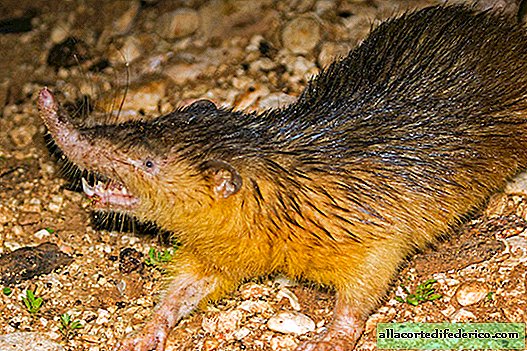Cuckoo bees: even among the bees there are arrogant parasites
The image of a bee is associated with an incredibly hard-working insect. They collect nectar all day, tirelessly flying from flower to flower, build an incredibly complex dwelling, maintain the necessary microclimate in it, and all this for the sake of the future generation. Growing healthy offspring and ensuring the continued existence of bees is the most important task of every bee swarm. But it turns out that not all bees are such zealous toilers, whose whole life is devoted to serving the family and caring for posterity. Among these insects there are thousands of species that can safely be called parasites and parasites. They use other types of bees as nannies and nurses for their offspring, but do not bother with such fuss.
 Neon cuckoo bee - one of the types of parasites
Neon cuckoo bee - one of the types of parasitesIt is difficult to say how such a survival tactic arose, but its supporters are thousands of species of bees living in different corners of the globe. Females of such bees, like well-known cuckoos, lay their eggs in dwellings of other species. At the same time, entomologists note that such bees often have an external resemblance to bee-nurse, on which they parasitize. Such an evolutionary acquisition is very beneficial for parasites, because they can quietly slip into the nest.
 Bee larvae
Bee larvaeA larva of an alien species hatches and begins to absorb food carefully prepared by the owners, who are unaware of anything. Uninvited guests take someone else's place and absorb the food prepared by bees for the larvae of their species. This method of survival of the species is called kleptoparasitism. During evolution, parasitic species of bees have lost the ability to collect pollen in order to transfer it to the nest, and therefore they simply do not know how to feed offspring. By the way, they also do not build any nests - architectural skills were lost after these cunning adaptors realized that it was not necessary to build a hive for an easy and carefree life.
By the way, among bumblebees there are also similar parasites. More than 20 species of these insects also cannot collect pollen and parasitize on their relatives, shamelessly throwing their offspring to them.
 There are never lumps of pollen on the legs of parasitic bees - they simply are not able to collect
There are never lumps of pollen on the legs of parasitic bees - they simply are not able to collectBut this behavior is fraught for parasites with some troubles. It is possible that in the course of further evolution, nurse bees grow wiser and begin to distinguish their larvae from representatives of another species. And given the fact that there are less and less bees on the planet every year, the species due to which parasites grow offspring can disappear altogether. Such a turn of events will leave no chance for cuckoo bees - no matter how tricky they are, they will disappear after them.

















